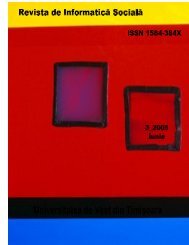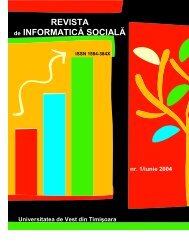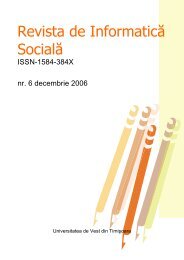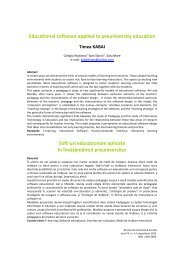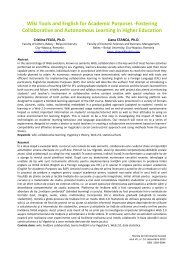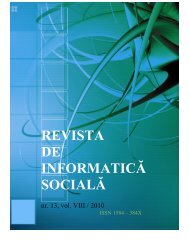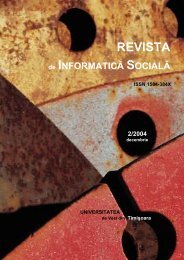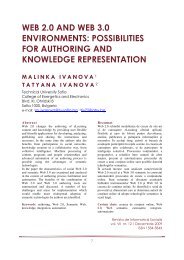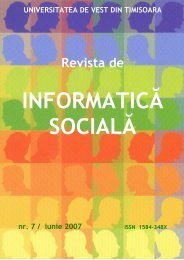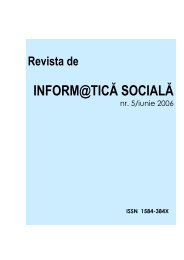Peer-to-Peer Voluntary AssociationsIn her recent and provocative book, DIY U: Edupunks, Edupreneurs, and the ComingTransformation <strong>of</strong> Higher Education [13], Anya Kamenetz <strong>de</strong>scribed the growing movementtoward high-tech, do-it-yourself education. Some <strong>of</strong> these experiments resi<strong>de</strong> within existinginstitutional settings, such as classes structured like role-playing, serious games that are being testedout in universities across the globe.Others are occurring in start-up organizations, like Peer2Peer University and the University <strong>of</strong> thePeople, attempting to bridge the gap between free online materials (as in the Khan Aca<strong>de</strong>my <strong>of</strong>Salman Khan, which <strong>of</strong>fers admired knowledge-nugget-sized YouTube vi<strong>de</strong>os on 1800 topics) andlow-cost education. Neeru Paharia and Jan Phillip Schmidt have hacked together Peer2PeerUniversity, which uses a Website to enable would-be stu<strong>de</strong>nts to convene and schedule courses,meet online, tutor one another, all facilitated by a volunteer. This is very much at the stage <strong>of</strong><strong>de</strong>monstration <strong>of</strong> concept. Shai Reshef foun<strong>de</strong>d University <strong>of</strong> the People and has enrolled the firstclass <strong>of</strong> 300 stu<strong>de</strong>nts from nearly 100 countries. His goal is to <strong>of</strong>fer bachelor’s <strong>de</strong>grees in businessand computer science using open courseware and volunteer faculty for a price <strong>of</strong> about $4,000 for afour-year <strong>de</strong>gree. Other pundits, such as Richard Ved<strong>de</strong>r, have mused about U.S. associate <strong>de</strong>greesfor as little as $2,000 (low by U.S. standards, but not globally). As already mentioned,StraighterLine is currently online with a full freshman year for $999.Formal Communities <strong>of</strong> PracticeInformal and formal communities <strong>of</strong> practice are common in the world <strong>of</strong> business and pr<strong>of</strong>essionalpractice. Transforming eKnowledge: A Revolution in Knowledge Sharing [<strong>14</strong>] <strong>de</strong>scribed theemergence <strong>of</strong> communities <strong>of</strong> practice as the <strong>de</strong>fining organizational form in the KnowledgeEconomy. These sorts <strong>of</strong> communities will become the focal points for open learning experiences inthe future. Oregon State University is <strong>de</strong>veloping an Open Campus <strong>de</strong>dicated to community-basedlearning. Extension Divisions in land grant universities across the U.S. have <strong>of</strong>ferings that couldbecome the basis for community-based learning. Another example is the Food Safety KnowledgeNetwork.In their partnership with the Global Food Safety Initiative, Michigan State is <strong>de</strong>veloping the FoodSafety Knowledge Network (FSKN) [15], a program <strong>of</strong> food safety resources to efficiently an<strong>de</strong>ffectively reach competency at all levels <strong>of</strong> food safety. The FSKN will use open resourcetechniques (social networking, dynamic knowledge sharing and evaluation tools) to harmonizestandards, practices, and training criteria. The FSKN pilot platform will be rolled out globally in2010. The FSKN will create a curriculum for food safety competency through partnerships withindustry, government, aca<strong>de</strong>mia, local/regional authorities and other stakehol<strong>de</strong>rs. Coupled with aunique learning environment using face-to-face sessions, seminars, formal courses and onlinelearning, it will present a low-cost, fast and efficient way for pr<strong>of</strong>essionals to achieve competenceacross all sectors <strong>of</strong> the food safety industry. MSU is also <strong>de</strong>ploying community-based techniquesto <strong>de</strong>velop entrepreneurial and innovative perspectives and behaviors in an interconnectingconstellation <strong>of</strong> Michigan-based and international communities.Community-<strong>of</strong>-practice learning is likely to thrive in the Web 2.0 environment. Its permutations aremany. Brown and Adler <strong>de</strong>scribed open, community-based environments in their article “Minds onFire: Open Education, the Long Tail, and Learning 2.0” [16]. One <strong>of</strong> the advantages <strong>of</strong> learningbased on real communities <strong>of</strong> practices will be the capacity to receive early warning <strong>of</strong> the emergingcompetences that are essential in particular fields <strong>of</strong> en<strong>de</strong>avor. Communities <strong>of</strong> practices will beable to i<strong>de</strong>ntify, promote and quickly <strong>de</strong>velop fresh competences among large bodies <strong>of</strong>participating practitioners.
Free-Range Open LearningOver time, individual learners will have access to a vast constellation <strong>of</strong> open learning experiencesand resources. These will range from formal communities <strong>of</strong> practice and competence buildingnetworks, to easily configured, temporary learning cohorts. Using these tools and experiences,individuals will be able to <strong>de</strong>velop, maintain, and extend their competence in a variety <strong>of</strong> ways andat very reasonable prices, or even at no cost. Even when “mature,” this array <strong>of</strong> alternatives will beperpetually changing, adapting and improving. Learning enterprises will need to adapt theirtechnologies, processes, and systems to accommodate this reality. In our experience, working withuniversities taking that path, it is important to i<strong>de</strong>ntify, celebrate and build upon the organizationalcapabilities that a university’s innovators have generated in the course <strong>of</strong> introducing onlinelearning and wi<strong>de</strong>ning the alternatives on <strong>of</strong>fer to stu<strong>de</strong>nts.This broa<strong>de</strong>ned environment will constitute a “free-range” option for learners who appreciatealternatives to traditional or even transformed institutional learning. These options will enable mostadult learners to more easily advance and maintain their competences by acquiring new an<strong>de</strong>merging skills at a pace that institutional learning cannot match – at least not today (just as there isno “I” in team, there is no “aca<strong>de</strong>mic senate” or “curriculum committee” in open learning).Open learning environments and experiences will interact with institutional learning, assessmentand certification experiences. Institutions that do an excellent job <strong>of</strong> competence-based learningmay become certifying entities that charge a fee for authenticating competences acquired throughopen learning, and awarding credit, certificates and <strong>de</strong>grees for a fee. This is one way in which thetwo evolutional paths <strong>of</strong> learning and competence link together. Mash-ups to encourage andfacilitate these linkages are un<strong>de</strong>r <strong>de</strong>velopment in Europe, in partnerships between business/industry(a primary source <strong>of</strong> information on the skills that graduates need to be employable) anduniversities. By way <strong>of</strong> an example, read through the <strong>de</strong>scription and materials on the ROLEproject, which is co-fun<strong>de</strong>d by the European Union [17].Many more examples exist across the globe, in a virtual archipelago <strong>of</strong> open learning experiments,prototypes and expeditions. Recently, some pundits have explored business mo<strong>de</strong>ls for openlearning en<strong>de</strong>avors, not requiring the seed funding from foundations, the European Commission andother parties that have sustained “first generation” open resource initiatives [19]. An apt set <strong>of</strong>questions may be: Which government(s) or corporate entities from across the globe will invest inopen resources in the future? Will they do so in a manner that will disrupt traditional <strong>of</strong>ferings andcreate opportunities for continuing re-invention <strong>of</strong> learning and competence building? How will thisfoment a change in the balance <strong>of</strong> competence power and the competition for talent across theglobe? Can “open” continue to be “completely free” or will a combination <strong>of</strong> free and fee benecessary to create sustainable open resource ecosystems?At the recent conference on “Reinventing the University: New Mo<strong>de</strong>ls and Innovations for 21stCentury Realities,” Paul LeBlanc, Presi<strong>de</strong>nt <strong>of</strong> the University <strong>of</strong> Southern New Hampshire,predicted a dramatic repositioning with the coming <strong>of</strong> richer, more nuanced, more reliable mo<strong>de</strong>lsfor assessing competencies that will enable us to “blow up the <strong>de</strong>livery mo<strong>de</strong>l [9].” The pricecompetition provi<strong>de</strong>d by self-paced, open courseware, social network-based, community-based,personalized learning environments and others will un<strong>de</strong>rmine the economics <strong>of</strong> traditional highereducation provi<strong>de</strong>rs, who must adapt to survive.Many Mo<strong>de</strong>ls, Competing for LearnersThe two intersecting, evolutionary axes <strong>of</strong> our five-stage mo<strong>de</strong>l do not suggest that any singlemo<strong>de</strong>l will become dominant for all learners, at all stages <strong>of</strong> their <strong>de</strong>velopment. But they do meanthat institutions will need to sort out their competitive position and <strong>de</strong>termine how to provi<strong>de</strong> arange <strong>of</strong> options that will be optimally attractive to their learners and that will put the U.S. on asustainable economic course. Merely digitizing the traditional and hoping for the best will not be awinning strategy.
- Page 1: Revista de Informatica Sociala 14 /
- Page 7: ● ● ●CONTENTS● ● ●[9-20
- Page 10 and 11: THE TRANSITION FROM OLD TO NEW MEDI
- Page 12 and 13: 30252023.420.325.11510500.85.5Never
- Page 14 and 15: Overall, we can therefore sum up on
- Page 16 and 17: n.a.I often use itI seldom use it6.
- Page 18 and 19: - Traditional web use: searching th
- Page 20 and 21: 19. Kvavik R.B., Caruso J.B. and Mo
- Page 22: IntroductionIn 1995, Bernie Dodge o
- Page 25 and 26: The Web-Inquiry Project [WIP] is a
- Page 27 and 28: and even orally. The teacher will a
- Page 29 and 30: environment in which the teacher gu
- Page 31 and 32: Transformation Through Online Learn
- Page 33 and 34: INTRODUCTIONLeading practitioners a
- Page 35 and 36: learning. We also describe how the
- Page 37 and 38: Some of these transformations are b
- Page 39 and 40: Recently, Twigg has received suppor
- Page 41 and 42: Stage III: Unbundled Learning, Mark
- Page 43 and 44: perhaps using Second Life-like virt
- Page 45: performance. Indeed, Stage V will l
- Page 49 and 50: New communities, tools and services
- Page 51 and 52: Embed enterprise-wide predictive an
- Page 53 and 54: In collaboration with Strategic Ini
- Page 55 and 56: Wiki Tools and English for Academic
- Page 57 and 58: eality. Besides being an additional
- Page 59 and 60: StudentPage 1StudentPage nTeacher
- Page 61 and 62: 100%90%80%70%60%50%40%30%20%10%0%Ac
- Page 63 and 64: 200Correlation View/Page Edits150Vi
- Page 65 and 66: 14. http://eacea.ec.europa.eu/llp/s
- Page 67 and 68: Simularea şi comunicarea electroni
- Page 69 and 70: RespondenţiRăspunsuriLa nivelul
- Page 71 and 72: RespondenţiRăspunsuriLa nivelul
- Page 73 and 74: Respondenţii au fost rugaţi să i
- Page 75 and 76: Itemul 9 doreşte să identifice ti
- Page 77 and 78: Identificara opţiunii, chiar şi p
- Page 79 and 80: EşantioaneRăspunsuri/Ranguriagita
- Page 81 and 82: modalităţile practice prin care u
- Page 83 and 84: 1. INTRODUCEREÎn prezent, complexi
- Page 85 and 86: Figura 1. Analiza grafică a evolu
- Page 87 and 88: Faţă de această situaţie se deg
- Page 89 and 90: variabilele acesti noi culturi cybe
- Page 91 and 92: INTRODUCEREÎncă din anul 2000 am
- Page 93 and 94: după tipul lecţiei: prezentare de
- Page 95 and 96: Funcţiile oferite de AEL asigură
- Page 97 and 98:
• elevi/studenţi, beneficiari di
- Page 99 and 100:
Se poate folosi cadrul formal de co
- Page 102 and 103:
Evaluarea formativă este comentari
- Page 104 and 105:
Rezultatele elevilor, pe itemi:Diag
- Page 106 and 107:
Nr. Denumirea activităţii AEL MOO
- Page 108 and 109:
SEMNAL EDITORIALLaura MALITA, Vanna
- Page 110:
IN MEMORIAMConstantin TraianCHEVERE



